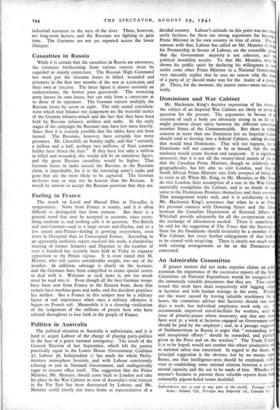Politics in Australia
The political situation in Australia is unfortunate, and it is hard to acquit Labour of the charge of playing party-politics in the face of a grave national emergency. The result of the General Election of last September, which left the parties practically equal in the Lower House (Government Coalition 37, Labour 36, Independent I) has made the whole Parlia- mentary atmosphere feverish, and with Labour consistently refusing to join in National Government, and undisguisedly eager to assume office itself. The suggestion that the Prime Minister, Mr. Menzies, should come back to London and take his place in the War Cabinet in view of Australia's vital interest in the Far East has been denounced by Labour, and Mr. Menzies could clearly not leave home as representative of a divided country. Labour's attitude on this point was not ne sarily factious, for there are strong arguments for keeping Prime Minister in his own country in time of crisis. But, content with that, Labour has called on Mr. Menzies to r his Premiership in favour of Labour, on the ostensible gr that the Government majority is not cohesive, and political instability results. To that Mr. Menzies, who shown his public spirit by declaring his willingness to se under some other Prime Minister in a National Governor very naturally replies that he sees no reason why the lea of a party of 37 should make way for the leader of a party 36. There, for the moment, the matter rests—most unsatisfaa torily.


































 Previous page
Previous page